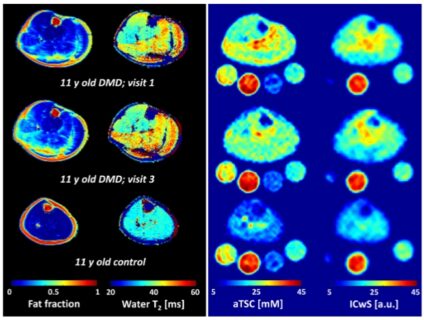New paper: Longitudinal Follow-Up of Patients With DuchenneMuscular Dystrophy Using Quantitative 23Na and 1H MRI
Congratulations to Dr. rer. nat. Teresa Gerhalter and co-authors on the recently published article “Longitudinal Follow-Up of Patients With DuchenneMuscular Dystrophy Using Quantitative 23Na and 1H MRI”!
This longitudinal MRI study in boys with Duchenne muscular dystrophy (DMD) found that sodium levels—specifically apparent tissue sodium concentration (aTSC) and intracellular-weighted sodium signal (ICwS)—are elevated even in muscles with low fat infiltration, indicating early disruptions in ion homeostasis. While aTSC alone showed a weak trend with fat fraction progression, a combined model revealed that aTSC, ICwS, and water T₂ are significant predictors of disease progression. These findings suggest sodium MRI could serve as an early biomarker of DMD activity, independent of fat replacement.
The full article can be found here:
